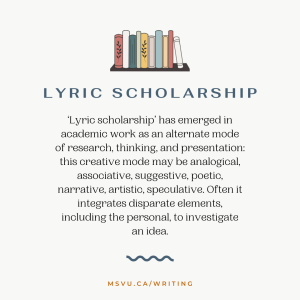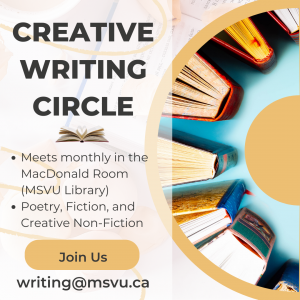“Without language, we are lost creatures in a meaningless existence—which is why we tell stories.” – Thomson Highway
Lyric Scholarship:

Early proponents of lyric scholarship arose in diverse fields—from Paulo Freire in Education to Jan Zwicky in Philosophy to Iain McGilchrist in Psychology and Neuroscience. Today, creative modes of scholarship—including as theses and dissertations—have been used as methodology and presentation not only in philosophy and literature but also law, social science, political studies, and (even!) Canadian copyright law.
Zwicky in Lyric Philosophy (1992) defined this mode as “thinking in love with clarity” and considers style as a form of thought. Neuroscientist McGilchrist noted in The Master and His Emissary (2012) that this mode of perception can be developed and practiced. Creative Writing is one way to do that. Our page supports your creative writing courses, class assignments, workshops, translations, or private practice. Enjoy!
- Lyric Philosophy — Brush Education Inc.
- The Master and His Emissary: The Divided Brain and the Making of the Western World by Iain McGilchrist | Books | The Guardian
Community of Practice:

Annual CBC Reading and Writing debates/competitions:
On Writing: Guides on the Trail
If you love “Top 10” lists:
Or Walter Benjamin’s “Top 13”:
“Poetry is a life-cherishing force. For poems are not words, after all, but fires for the cold, ropes let down to the lost, something as necessary as bread in the pockets of the hungry.” ― Mary Oliver, A Poetry Handbook
On Poetry:
Practical and beautiful — its tiny chapter “The Line” is worth everything, Also covered: Reading poems aloud / The sound of poetry / Poetic devices / Formal poetry and free verse / Diction, tone, and voice / Imagery:
- A Poetry Handbook by Mary Oliver, Paperback | Barnes & Noble®
- Anne Lamott on Writing and Why Perfectionism Kills Creativity
Submissions, Contests, Prizes:
Plus, a recent list of peer-reviewed Canadian journals accepting creative submissions (for the best of your best work):
“I’ve always conceived of language as music.” – Tomson Highway
